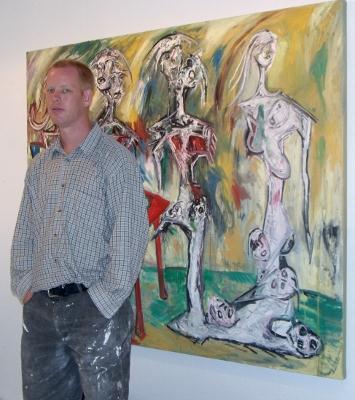It was once a sanctuary for alternative art, but now the Patrick John Mills Gallery is a ghost of its former self. The smell of sawdust hangs in the air and the residence on Hinchey Ave is virtually empty, although works by queer artists such as Andrew Gayed and Mathieu Laca and trans artist Lilly Butter still hang on the walls.
Bowing to pressure from the city, the LCBO and neighbours, Mills has chosen to close his home-based Hintonburg business. Although he never incurred an official fine, Mills says the forces working against him have made it impossible for him to continue to run a successful art gallery.
Originally from St-Jérôme, Quebec, Mills lived in Vancouver and England before settling in Ottawa eight years ago. His passion for painting was born when a university classmate introduced him to the art form, and after the monotony of self-promotion wore thin, Mills opened his gallery in 2007 as an outlet to showcase other artists’ works in addition to his own.
When Mills officially opened the gallery, he says, one anonymous neighbour ripped up his posters and complained relentlessly for the first six months, but then the complaints trickled off.
Events at the gallery grew steadily over the years, and Mills built a stage in the backyard to accommodate musicians and theatre performances. The success of the gallery’s events allowed Mills to donate thousands of dollars’ worth of art to local charities, including Bruce House, Rideauwood and the Elizabeth Fry Society.
Mills says that when attendance at the gallery’s art shows ballooned to more than 500 people, municipal red tape began to strangle his business.
“I had the head office of the LCBO call, then I had undercover police come to my openings. I got an audit from Revenue Canada, food health and safety said I couldn’t serve hot dogs because I wasn’t a caterer, and I had the liquor inspectors come by, so I finally said fuck it,” Mills says while splattered with paint from the ongoing renovations to his home and gallery.
According to Mills, the issue with the LCBO stemmed from its position that his gallery is also his home, so he was not allowed to sell alcohol. He applied for a special-events permit, which was denied.
“The LCBO said, ‘You can give away alcohol and you can have a door charge, but the door charge has to be justified. So if you can justify that you are giving away free alcohol but they are getting something else,’ like the music or theatre. I don’t see what the problem is.”
Ottawa bylaw officers became involved when it was brought to their attention that hundreds of art lovers were congregating at Mills’ gallery. According to the zoning laws of his neighbourhood, a home-based business cannot have more than two people, or customers, on its premises at one time.
Mills says he was informed that he can have massive house parties, but the parties cannot be in any way affiliated with his business.
“How can you honestly run an art gallery if you can never have an art opening?” Mills asks. “You’re never allowed to have a vernissage, never allowed to have any special activities or presentations. It’s a waste of time. So the city didn’t necessarily close me, but they made it impossible to run a business.”
Jeff Leiper, with the Hintonburg Community Association (HCA), says the majority of the neighbourhood is sympathetic to Mills’ situation.
“We’re not protesting the city’s decision to essentially ask him to shut down, but nor do we entirely support it,” Leiper says. “We think it should be possible to run a gallery from a private home. Artists don’t necessarily fit within one economic model. It’s not right to ask artists to just stick to the model of working in a private space and then display in a gallery that may be in an area zoned for commercial. We think there needs to be a lot more latitude granted with respect to running a gallery.”
Leiper says the HCA can also see the city’s point of view as laws are implemented for a reason.
“At the end of the day, the zoning bylaws with respect to what’s residential and what’s commercial are there for a reason, to protect everyone’s peace and quiet.”
Leiper admits that the absence of Mills’ gallery will leave a gaping hole in the cultural landscape of the neighbourhood, adjacent to downtown.
Mills hasn’t decided where his new gallery will be located. He is in the process of chopping the property in half and plans to sell a portion of the land.
The last event to be held at 286 Hinchey Ave will be Art Is Dead, on Saturday, Aug 18.


 Why you can trust Xtra
Why you can trust Xtra


